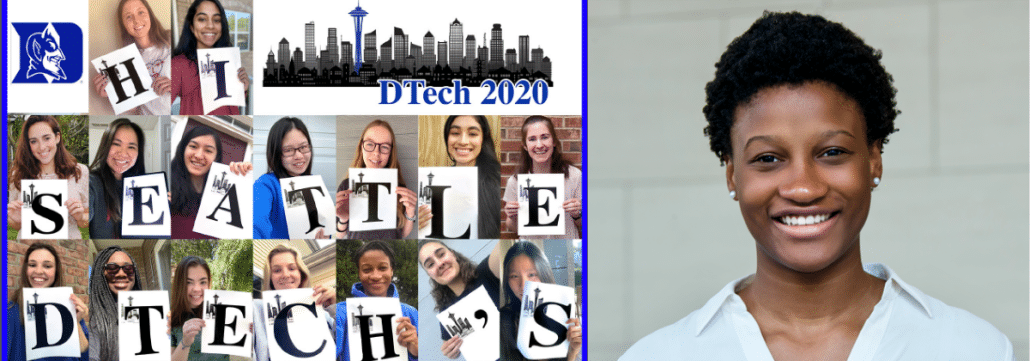Duke Technology Scholars Program – Tignis Q&A with Intern Micaelle (Mini) Larrieux

The Duke Technology Scholars Program (DTech) is a comprehensive effort to empower the next generation of diverse leaders who will bring increased innovation to the tech industry. The program centers around the idea that community, mentorship and hands-on experience make the difference in recruiting and retaining under-represented people in technology fields.
According to Amy Arnold, Executive Director of DTech, this year’s program includes 108 women studying Computer Science and/or Engineering. These talented women are doing technical summer internships at leading technology companies of all sizes, including 23 working for companies based in Seattle. Today’s blog post features an interview with Micaelle (Mimi) Larrieux, who is interning with Tignis.
Please tell us about yourself.
I am a rising junior at Duke University, although I’m just completing my first year as a student there because I spent my freshman year at Johns Hopkins University. I am from Massachusetts and went to boarding school in-state throughout high school. I enjoy volunteering with my church through various programs, and absolutely any sport you could name. My competitiveness and work ethic are some of the main reasons I believe I’m able to be successful when tackling new challenges.
Tell us about your background in engineering/computer science.
I remember having a love for STEM (science, technology, engineering, and mathematics) as early as middle school, when it became clear that the disciplines encouraged questions and the love of curiosity. This led me to try various engineering summer programs throughout high school, which solidified my interest in creating technology to help people. Because there were no engineering classes in my high school, I picked up computer science because it seemed interesting. I ended up completing two years’ worth of computer science along with some very interesting projects.
During my freshman year of college, I took a hiatus from the subject to pursue chemical and biomolecular engineering, but my interest was piqued once again upon my arrival at Duke when I decided to pursue degrees in biomedical engineering and computer science. I’ve only taken a few formal courses, but I do a lot of learning online and through the many available resources which has really helped me explore new topics outside of the classroom.
Can you tell us a bit about the Duke DTech program, and how you got involved?
At Duke, I’m part of a pre-professional tech organization called Catalyst. It was through Catalyst that someone suggested I look into DTech, and I immediately started attending workshops to learn more about computer science as well as the recruiting process. Amy Arnold and Kelly Perri have created a spectacular network of women in STEM who are eager to help and support each other during their time at Duke and through the recruiting process.
What made you want to intern at Tignis?
I was intrigued by Tignis at first glance because the idea of using computer-based analytics to evaluate mechanical systems—which I had learned about through my engineering courses—was very exciting. I’ve always loved engineering—not necessarily computer based—and the idea that I would have an opportunity to not only hone my computer science skills but also expand my knowledge of these systems really drew me to Tignis.
Another reason I was so excited by Tignis was the smaller size of the company, and my ability to make an impact through my work that would be of genuine use to my coworkers. Through conversations with my interviewers, it became clear that they too wanted to help me grow and learn in an environment that would challenge me, and as soon I heard that I couldn’t wait to get started!
What do you hope to learn at Tignis?
Although the circumstances in the summer of 2020 are anything but ordinary, I do hope to learn what it is like to operate in a start-up environment alongside a small group of coworkers. Being able to form connections and ask questions is really important to me, and I wanted to learn how to do so as a coworker as opposed to a student. With regard to software engineering, I hope to continue learning new languages and software essential pivotal to developing companies, as well as more about machine learning and analytics.
What have you learned so far?
I have learned too much to concisely recap in a paragraph. What comes to mind is my work learning about notebooks, databases, several Python packages, machine learning, and Git. This knowledge has allowed me to approach challenges with a deeper understanding of the software I’m using, as well as more elegant solutions to the projects, assignments, and ideas I’ve been confronted with in the past.
Where do you see yourself in 10 years, and how can Tignis get you there?
While I have no idea what kind of work I’ll be doing in 10 years, I hope that it will be challenging, and have the goal of making a positive impact on the lives of many people. Tignis has shown me what it is like to be in a collaborative yet challenging work environment. I also hope to have a good work-life balance, and generally just feel happy when I wake up in the morning. Having one-on-one conversations with my coworkers has really allowed for some great insight into how they achieve these goals, and I can only hope that I will be with a company that cares as much for its employees’ well-being as much as Tignis does.
What do you enjoy doing in your free time?
I love sports, and played volleyball in college my freshman year. I spent about 40 hours a week in season and at least 25 out of season playing and travelling. I still play a lot of outdoor volleyball—grass and beach. Overall, I really like to stay active and learn new things.
A closing word from Tignis’ Jon Herlocker
Tignis was pleased to hire Mimi Larrieux as a Seattle-based intern. When COVID-19 upset our plans, we both agreed to try and make this work remotely. The challenges could have been overwhelming. However, Mimi’s tenacity and personal skills, along with her software knowledge, have made it an easy and enjoyable engagement. The high-paced startup world doesn’t allow for a lot of hand-holding, and Mimi didn’t need it. She gathered requirements, asked questions as needed, and doggedly knocked off a series of ambitious tasks. She will be missed when she returns to Duke, and we wish her great success.







